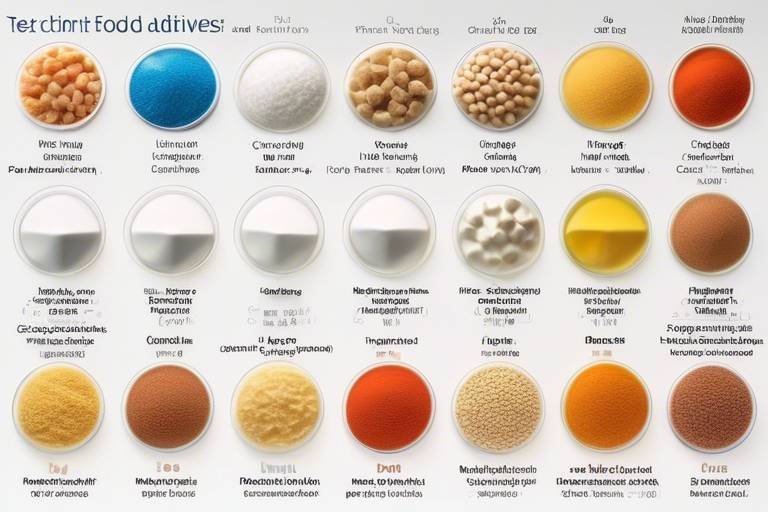The Biology of Heart Health - Keeping Your Heart Strong
When it comes to our bodies, the heart is like the engine of a car—absolutely vital for keeping everything running smoothly. Understanding the biology of heart health is not just for doctors or health enthusiasts; it’s for everyone who wants to live a long, vibrant life. So, what makes this muscle so special? Let’s dive into the anatomy of the heart, explore common diseases, and uncover the lifestyle changes that can help keep your cardiovascular system in tip-top shape.
The heart is a remarkable organ, composed of four chambers: the right atrium, right ventricle, left atrium, and left ventricle. Each chamber plays a unique role in the circulatory system. The right atrium receives deoxygenated blood from the body, while the right ventricle pumps it to the lungs for oxygenation. Meanwhile, the left atrium collects oxygen-rich blood from the lungs, and the left ventricle is responsible for pumping it out to the rest of the body. This intricate dance of blood flow is facilitated by heart valves, which ensure that blood moves in the right direction and doesn’t backtrack.
But wait, there’s more! Major blood vessels, such as the aorta, pulmonary arteries, and veins, are essential for transporting blood to and from the heart. Think of these vessels as highways, allowing blood to travel efficiently throughout the body. Understanding this anatomy is crucial because it lays the foundation for recognizing how diseases can disrupt this delicate system.
Heart diseases are like uninvited guests that crash the party of good health. They can lead to severe complications if not addressed. Some of the most common conditions include:
- Coronary Artery Disease (CAD): This occurs when the coronary arteries become narrowed or blocked, limiting blood flow to the heart muscle. Symptoms may include chest pain or discomfort.
- Heart Failure: This doesn’t mean the heart stops working; rather, it means the heart isn’t pumping as effectively as it should. Symptoms can include shortness of breath and fatigue.
- Arrhythmias: These are irregular heartbeats that can feel like your heart is skipping a beat or racing. Some arrhythmias are harmless, while others can be life-threatening.
Identifying risk factors is like putting together a puzzle; each piece helps you see the bigger picture of your heart health. Common risk factors include:
- Lifestyle Choices: Smoking, poor diet, and lack of exercise can all contribute to heart disease.
- Genetic Predispositions: If heart disease runs in your family, you might be at a higher risk.
- Environmental Influences: Stressful living conditions and exposure to pollution can also play a role.
Prevention is the best medicine, and when it comes to heart health, it’s crucial to take proactive steps. Regular check-ups and screenings can help catch any potential issues early on. Lifestyle adjustments, such as maintaining a healthy weight, exercising regularly, and eating a balanced diet, are essential for keeping your heart strong.
Nutrition is a significant player in the game of heart health. A heart-healthy diet is rich in fruits, vegetables, whole grains, and lean proteins. Foods high in omega-3 fatty acids, like salmon and walnuts, can help reduce inflammation and lower the risk of heart disease. It’s like giving your heart a nourishing hug from the inside out!
Let’s not forget about the importance of physical activity! Regular exercise strengthens the heart muscle and improves circulation. Activities like walking, cycling, and swimming can be incredibly beneficial. Aim for at least 150 minutes of moderate aerobic activity each week. Think of exercise as a way to fuel your heart with the energy it needs to keep going strong.
Stress is like a sneaky thief that can rob your heart of its health. It’s essential to find effective ways to manage stress, whether through mindfulness, yoga, or simply taking time to relax with a good book. Remember, a calm heart is a happy heart!
Our heart health needs change as we age. In childhood, it’s about building strong habits, while adulthood focuses on maintaining those habits to prevent disease. As we get older, regular check-ups become even more critical. Lifelong care and awareness are vital to ensuring our hearts remain strong throughout our lives.
Q: How often should I get my heart checked?
A: It's generally recommended to have a check-up at least once a year, but consult with your healthcare provider for personalized advice.
Q: Can heart disease be reversed?
A: While some forms of heart disease can be managed or improved through lifestyle changes and medication, it's essential to consult a healthcare professional for guidance.
Q: What are the signs of a heart attack?
A: Common signs include chest pain, shortness of breath, and discomfort in other areas like the arms, back, neck, or jaw. If you experience these symptoms, seek medical attention immediately.

Anatomy of the Heart
The heart is an incredible organ, often referred to as the body's engine. It tirelessly pumps blood throughout the body, ensuring that every cell receives the oxygen and nutrients it needs. Understanding the anatomy of this vital organ is essential for grasping how it functions and maintaining heart health. The heart consists of four main chambers: the right atrium, right ventricle, left atrium, and left ventricle. Each chamber plays a unique role in the circulation of blood.
The right atrium receives deoxygenated blood from the body through two large veins known as the superior and inferior vena cavae. Once filled, it contracts and sends blood into the right ventricle, which then pumps the blood to the lungs via the pulmonary arteries. Here, the blood releases carbon dioxide and picks up oxygen, becoming oxygenated.
Now, the left atrium takes center stage. It receives the oxygen-rich blood from the lungs through the pulmonary veins. When the left atrium contracts, blood flows into the left ventricle, the strongest chamber of the heart. The left ventricle then pumps this oxygenated blood out to the rest of the body through the aorta, the largest artery in the body. This remarkable journey of blood circulation is crucial for sustaining life.
In addition to the chambers, the heart has valves that ensure blood flows in the right direction. There are four main valves:
- Tricuspid Valve: Located between the right atrium and right ventricle.
- Pulmonary Valve: Found between the right ventricle and the pulmonary arteries.
- Mitral Valve: Positioned between the left atrium and left ventricle.
- Aortic Valve: Located between the left ventricle and the aorta.
These valves open and close with each heartbeat, preventing backflow and ensuring that blood moves efficiently through the heart and into the circulatory system. The heart is also surrounded by a protective layer called the pericardium, which helps to keep it in place and reduces friction as it beats.
Understanding the anatomy of the heart is just the beginning. It's fascinating to think about how this complex structure works in harmony with other systems in the body. The heart's electrical system, for instance, is responsible for maintaining a steady heartbeat. The sinus node, often referred to as the heart's natural pacemaker, generates electrical impulses that trigger each heartbeat. These impulses travel through the heart muscle, causing it to contract and pump blood.
In summary, the heart's anatomy is a remarkable example of biological engineering, showcasing a finely-tuned system that has evolved to meet the demands of our bodies. By understanding how the heart functions, we can better appreciate the importance of maintaining its health through lifestyle choices, regular check-ups, and awareness of heart disease.
- What are the primary functions of the heart? The heart's primary functions include pumping oxygenated blood to the body and returning deoxygenated blood to the lungs.
- How does the heart's electrical system work? The heart's electrical system generates impulses that trigger heartbeats, ensuring a consistent rhythm.
- What can I do to keep my heart healthy? Regular exercise, a balanced diet, and routine health check-ups are essential for maintaining heart health.

Common Heart Diseases
Heart diseases are more than just a medical term; they represent a serious threat to our health and well-being. Understanding these conditions is essential for anyone looking to safeguard their cardiovascular system. Let's dive into a few of the most common heart diseases that affect millions of people worldwide.
One of the most prevalent conditions is coronary artery disease (CAD). This occurs when the arteries that supply blood to the heart become narrowed or blocked, often due to a buildup of cholesterol and fatty deposits, a process known as atherosclerosis. Imagine your arteries as highways; when traffic builds up, it slows down the flow of vehicles, leading to congestion. Similarly, when arteries are blocked, the heart struggles to receive the oxygen it needs, which can lead to chest pain, heart attacks, or even sudden cardiac death.
Next on the list is heart failure, a condition where the heart can no longer pump blood effectively. It’s like trying to use a battery that’s run out of juice; no matter how hard you push, it just won’t work properly. Symptoms of heart failure include shortness of breath, fatigue, and swelling in the legs and ankles. This condition can arise from various factors, including high blood pressure, previous heart attacks, or chronic diseases like diabetes.
Another common issue is arrhythmias, which are irregular heartbeats. Think of your heart as a drummer in a band; if the drummer loses the beat, the music becomes chaotic. Arrhythmias can cause the heart to beat too fast, too slow, or erratically, leading to symptoms like dizziness, palpitations, or even fainting. While some arrhythmias are harmless, others can be life-threatening and require immediate medical attention.
In addition to these conditions, there are several other heart diseases worth mentioning:
- Valvular heart disease: This involves damage to one or more of the heart's valves, affecting blood flow.
- Congenital heart defects: These are structural problems with the heart present at birth, which can affect how blood flows through the heart.
- Cardiomyopathy: This is a disease of the heart muscle that affects its size, shape, and ability to pump blood.
Each of these conditions comes with its own set of risk factors and symptoms, making it crucial for individuals to be aware of their heart health. Regular check-ups and screenings can help detect these diseases early, allowing for timely intervention and better management of the condition.
In summary, heart diseases are a significant health concern that can affect anyone, regardless of age or lifestyle. By understanding the common types of heart diseases and their implications, you can take proactive steps to monitor your heart health and seek medical advice when necessary.
What are the early signs of heart disease?
Common early signs include chest pain, shortness of breath, fatigue, and irregular heartbeats. If you experience any of these symptoms, it's important to consult a healthcare professional.
Can heart disease be prevented?
Yes, many forms of heart disease can be prevented through lifestyle changes such as maintaining a healthy diet, exercising regularly, and avoiding smoking.
How often should I get my heart checked?
It's recommended to have regular check-ups with your healthcare provider, especially if you have risk factors for heart disease. Generally, adults should have their blood pressure and cholesterol levels checked at least once a year.
Is heart disease hereditary?
Yes, genetics can play a role in heart disease. If you have a family history of heart conditions, it's important to discuss this with your doctor.

Risk Factors for Heart Disease
When it comes to heart disease, understanding the risk factors is like having a roadmap to a healthier life. There are several elements that can increase your chances of developing heart-related issues, and recognizing these can empower you to take control of your heart health. Let's dive into some of the primary risk factors that you should be aware of.
First and foremost, lifestyle choices play a significant role in heart health. For instance, poor diet, lack of physical activity, and smoking are major contributors to heart disease. Imagine your body as a car; if you fuel it with low-quality gasoline and neglect maintenance, it’s bound to break down sooner rather than later. Similarly, your heart needs quality nutrition and regular exercise to function optimally.
Next, we have genetic predispositions. If heart disease runs in your family, it’s essential to be vigilant. Genetics can be a tough pill to swallow, but knowing your family history can help you make informed choices. For example, if your parents or siblings have had heart issues, you might want to get regular check-ups and monitor your heart health more closely.
Another factor to consider is age. As you get older, the risk of heart disease generally increases. This is because blood vessels can become stiffer and narrower over time, making it easier for plaque to build up. Think of aging like a tree; as it grows, its branches may become more brittle, making it more susceptible to storms. Similarly, your heart can face more challenges as you age.
Moreover, high blood pressure and high cholesterol levels are significant risk factors. They often go hand in hand and can silently wreak havoc on your cardiovascular system. Regular check-ups can help detect these issues before they escalate. It’s like having a smoke detector in your home; it alerts you to potential dangers before they become a full-blown fire.
Let’s not forget about stress. Chronic stress can lead to unhealthy habits like overeating or smoking, which can further increase your risk of heart disease. Managing stress is crucial; it’s not just about keeping calm but also about finding healthy outlets like exercise, meditation, or hobbies that bring you joy.
To summarize, here’s a quick overview of some common risk factors:
- Poor diet
- Lack of physical activity
- Smoking
- Genetic predisposition
- Age
- High blood pressure
- High cholesterol
- Chronic stress
By being aware of these risk factors, you can take proactive steps to mitigate them. Whether it’s adopting a healthier diet, engaging in regular physical activity, or managing stress effectively, every little change can make a big difference in your heart health. Remember, your heart is your lifeline, so treat it with the care it deserves!
Q: Can heart disease be prevented?
A: Yes, many forms of heart disease can be prevented through lifestyle changes, regular check-ups, and managing risk factors.
Q: How often should I get my heart checked?
A: It’s advisable to have regular check-ups at least once a year, especially if you have risk factors for heart disease.
Q: What are some heart-healthy foods?
A: Foods rich in omega-3 fatty acids, such as salmon and walnuts, as well as fruits, vegetables, and whole grains, are excellent for heart health.
Q: Is it too late to start exercising for heart health?
A: No, it’s never too late! Starting an exercise routine, even in your later years, can significantly improve your heart health.

Preventive Measures
When it comes to heart health, prevention is not just a buzzword; it's a lifestyle choice that can dramatically impact your longevity and quality of life. Think of your heart as a high-performance engine. Just like any engine, it requires regular maintenance to keep running smoothly. So, what can you do to ensure that your heart stays in top shape? Here are some key preventive measures that can help you maintain a strong cardiovascular system.
First and foremost, regular check-ups with your healthcare provider are essential. These visits are your opportunity to catch any potential issues before they escalate. During these check-ups, doctors can perform various screenings, such as blood pressure measurements, cholesterol tests, and blood sugar levels, to assess your heart health. The earlier you detect any irregularities, the better your chances of managing them effectively.
Another crucial aspect of heart health is adopting a heart-healthy lifestyle. This includes a balanced diet rich in fruits, vegetables, whole grains, and lean proteins. Foods that are high in omega-3 fatty acids, such as salmon and walnuts, can significantly benefit your heart. Additionally, try to limit your intake of saturated fats, trans fats, and sodium. To illustrate this, consider the following table that highlights some heart-healthy foods:
| Food | Benefits |
|---|---|
| Salmon | Rich in omega-3 fatty acids, which reduce inflammation and lower blood pressure. |
| Spinach | Loaded with antioxidants and vitamins that promote overall heart health. |
| Oats | High in soluble fiber, which helps lower cholesterol levels. |
| Almonds | Contain healthy fats, fiber, and protein, which are beneficial for heart health. |
Physical activity is another cornerstone of heart health. Engaging in regular exercise not only helps maintain a healthy weight but also strengthens the heart muscle. Aim for at least 150 minutes of moderate aerobic activity or 75 minutes of vigorous activity each week. Whether it's brisk walking, cycling, or swimming, find an activity you enjoy and make it a part of your routine. Remember, even small bursts of activity throughout the day can add up!
Managing stress is equally important in the quest for a healthy heart. Chronic stress can lead to a host of issues, including high blood pressure and unhealthy eating habits. Incorporating stress-reduction techniques such as meditation, yoga, or even simple deep-breathing exercises can help you keep your heart in check. Picture your heart as a balloon; too much stress can make it pop, but a little relaxation can keep it floating gently.
Lastly, don't underestimate the power of social connections. Having a strong support system can significantly reduce stress and improve your overall well-being. Surround yourself with friends and family who encourage healthy habits and provide emotional support. Engaging in community activities or group workouts can also foster a sense of belonging and motivate you to stay active.
In summary, taking preventive measures for heart health is about making informed choices and being proactive. By prioritizing regular check-ups, adopting a heart-healthy diet, staying physically active, managing stress, and nurturing social connections, you can pave the way for a resilient heart. Remember, your heart is not just an organ; it's the rhythm of your life!
- How often should I get my heart checked?
It is generally recommended to have a heart health check-up at least once a year, but this can vary based on individual risk factors. - What are some signs of heart disease?
Common signs include chest pain, shortness of breath, fatigue, and irregular heartbeats. If you experience these, consult your doctor immediately. - Can stress really affect my heart health?
Yes, chronic stress can lead to high blood pressure and unhealthy coping mechanisms, which can negatively impact heart health. - What types of exercise are best for heart health?
Aerobic exercises such as walking, running, cycling, and swimming are excellent for improving cardiovascular fitness.

The Role of Diet
When it comes to heart health, diet plays a pivotal role. Think of your heart as a high-performance engine; it needs the right fuel to run smoothly. The foods you consume not only affect your overall health but also have a direct impact on your cardiovascular system. A balanced diet rich in nutrients can help lower blood pressure, reduce cholesterol levels, and maintain a healthy weight—all crucial factors in keeping your heart strong.
So, what does a heart-healthy diet look like? It’s all about making smart choices. Incorporating a variety of fruits, vegetables, whole grains, and lean proteins into your meals can create a solid foundation for heart health. For instance, foods rich in omega-3 fatty acids, such as salmon, walnuts, and flaxseeds, are known to help reduce inflammation and lower the risk of heart disease. Similarly, fiber-rich foods like oats, beans, and lentils can help lower cholesterol levels and keep your digestive system in check.
But let’s not forget about the importance of limiting unhealthy fats. Trans fats and saturated fats can lead to the buildup of plaque in your arteries, increasing the risk of heart disease. Instead of reaching for processed foods, opt for healthier fats found in avocados, nuts, and olive oil. These can actually help improve your cholesterol levels while providing essential nutrients.
Another critical aspect of a heart-healthy diet is watching your sodium intake. High sodium levels can lead to hypertension, a major risk factor for heart disease. It’s recommended to keep your sodium intake below 2,300 milligrams per day, and even lower if you have existing health issues. Reading labels and choosing fresh, whole foods over packaged ones can make a significant difference in managing your sodium levels.
Let’s talk about portions and meal timing. Eating smaller, more frequent meals can help maintain energy levels and prevent overeating, which is beneficial for heart health. Additionally, being mindful of when you eat can also play a role. For example, consuming larger meals late in the evening can disrupt sleep and lead to weight gain, both of which can negatively impact heart health.
To summarize, a heart-healthy diet is not just about cutting out the bad; it's about embracing the good. Here’s a quick overview of some heart-healthy foods:
| Food Group | Examples | Benefits |
|---|---|---|
| Fruits & Vegetables | Spinach, Berries, Apples | Rich in vitamins, minerals, and antioxidants |
| Whole Grains | Brown Rice, Quinoa, Oats | High in fiber, helps lower cholesterol |
| Lean Proteins | Chicken, Fish, Legumes | Supports muscle health without excess fat |
| Healthy Fats | Olive Oil, Avocados, Nuts | Improves cholesterol levels |
In conclusion, adopting a heart-healthy diet is one of the most effective ways to support your cardiovascular health. By making informed food choices and being mindful of your eating habits, you can significantly reduce your risk of heart disease and enjoy a healthier, longer life.
- What are some quick heart-healthy meals? Meals like grilled chicken with quinoa and steamed vegetables or a salad topped with nuts and berries are both nutritious and easy to prepare.
- Can I still enjoy my favorite foods? Yes! Moderation is key. You can still enjoy your favorite foods occasionally, but balance them with healthier options.
- How much exercise do I need to complement my diet? Aim for at least 150 minutes of moderate aerobic activity each week, along with strength training on two or more days.

Exercise and Heart Health
When it comes to maintaining a healthy heart, **exercise** is like the secret sauce that can make all the difference. Think of your heart as a muscle – just like your biceps or quads, it requires regular workouts to stay strong and efficient. Engaging in physical activity not only helps to keep your heart pumping but also reduces the risk of heart disease, high blood pressure, and other cardiovascular issues. But what types of exercises are best for heart health? Let's break it down!
First, aerobic exercises are the rock stars of heart health. These are activities that get your heart rate up and keep it there for an extended period. Examples include:
- Running or jogging
- Cycling
- Swimming
- Dancing
- Brisk walking
Incorporating these activities into your routine can significantly boost your cardiovascular fitness. Just imagine your heart as a high-performance engine – the more you rev it up, the better it runs! Aim for at least **150 minutes** of moderate aerobic exercise each week, or **75 minutes** of vigorous activity. That sounds like a lot, but it breaks down to just about 30 minutes a day, five days a week. Easy peasy, right?
But wait, there's more! Strength training is also a vital component of a heart-healthy exercise regimen. While it may not get your heart racing quite like cardio, building muscle mass can improve your metabolism and help manage your weight, which is crucial for heart health. Aim to include strength training exercises at least **two days a week**. This can involve using free weights, resistance bands, or even body-weight exercises like push-ups and squats.
Now, let’s talk about flexibility and balance. These exercises, such as yoga and tai chi, may not seem directly related to heart health, but they play an essential role in overall wellness. They can help reduce stress, improve circulation, and enhance your ability to perform daily activities without injury. After all, a relaxed body is a happy heart!
Another important aspect to consider is consistency. It’s not just about fitting in a workout here and there; it’s about making exercise a regular part of your life. Finding activities you enjoy can help you stick with it. Whether it’s joining a dance class, hiking with friends, or simply taking your dog for a walk, the key is to stay active. Remember, every little bit counts!
Lastly, don’t forget to listen to your body. If you’re just starting out or have any pre-existing health conditions, it’s wise to consult with a healthcare professional before diving into a new exercise routine. They can help tailor a program that’s safe and effective for you.
In summary, exercise is a cornerstone of heart health. By incorporating a mix of aerobic, strength, and flexibility exercises into your weekly routine, you can keep your heart strong and resilient. So, lace up those sneakers and get moving – your heart will thank you!
1. How often should I exercise for heart health?
Aim for at least 150 minutes of moderate aerobic exercise each week, or 75 minutes of vigorous activity. This can be broken down into manageable sessions throughout the week.
2. Can I do strength training and cardio on the same day?
Absolutely! Many people combine strength training and cardio into one workout. Just make sure to listen to your body and allow for adequate recovery time.
3. What if I have a busy schedule?
Even short bursts of activity can be beneficial. Try to incorporate movement into your daily routine, like taking the stairs instead of the elevator or going for a brisk walk during your lunch break.
4. Is it too late to start exercising for heart health?
It’s never too late! Starting an exercise program can benefit people of all ages. Just start slowly and gradually increase your activity level.

Managing Stress
When it comes to heart health, one of the often-overlooked factors is stress management. In our fast-paced world, stress can feel like an uninvited guest that just won’t leave. It creeps into our lives, affecting not only our mental state but also our physical health, particularly our heart. Imagine your heart as a finely tuned engine; when stress revs it up too high, it can lead to serious issues. But how do we manage stress effectively? Let’s dive into some strategies that can help.
First off, it’s essential to recognize the signs of stress. These can include feelings of anxiety, irritability, and even physical symptoms like headaches or an upset stomach. Understanding your body’s response to stress is the first step in managing it. Once you’re aware of how stress affects you, you can take proactive measures to mitigate its impact. Here are some effective techniques:
- Mindfulness and Meditation: These practices help ground you in the present moment, reducing anxiety and promoting relaxation. Just a few minutes a day can make a significant difference.
- Physical Activity: Exercise isn’t just good for your body; it’s a powerful stress reliever. Whether it’s a brisk walk, a dance class, or yoga, moving your body can improve your mood and heart health.
- Connect with Others: Sometimes, all it takes to lighten the load is talking to a friend or loved one. Social connections can provide emotional support and help you feel less isolated.
- Breathing Techniques: Deep breathing exercises can calm your nervous system and lower stress levels. Try inhaling deeply through your nose, holding for a moment, and then exhaling slowly through your mouth.
Additionally, managing your time effectively can significantly reduce stress. Make a to-do list and prioritize tasks to avoid feeling overwhelmed. Remember, it’s perfectly okay to say no to additional responsibilities if you’re already stretched thin. Think of your time as a limited resource; spending it wisely is crucial for maintaining your heart health.
Another important aspect of stress management is ensuring you get enough sleep. Quality sleep is vital for both mental and physical health. Lack of sleep can exacerbate stress and lead to a cycle that’s hard to break. Aim for 7-9 hours of restful sleep each night to give your body the chance to recover and rejuvenate.
Lastly, don't underestimate the power of hobbies and relaxation techniques. Engaging in activities you love can serve as a fantastic escape from daily stressors. Whether it’s painting, gardening, or playing a musical instrument, finding joy in these activities can be a great way to unwind.
In conclusion, managing stress is not just about avoiding the pressures of life; it’s about actively taking steps to protect your heart. By incorporating mindfulness, exercise, social connections, and good sleep hygiene into your routine, you can significantly reduce stress levels and promote a healthier heart. Remember, it’s not about eliminating stress entirely; it’s about how you respond to it. Your heart will thank you!
Q: How does stress affect heart health?
A: Chronic stress can lead to high blood pressure, increased heart rate, and inflammation, all of which can elevate the risk of heart disease.
Q: What are some quick stress relief techniques?
A: Deep breathing exercises, short walks, and stretching can provide immediate relief from stress.
Q: Is it possible to manage stress without medication?
A: Yes, many people find success with lifestyle changes, therapy, and stress management techniques.

Heart Health Across the Lifespan
When it comes to heart health, understanding that it evolves throughout our lives is crucial. From the moment we take our first breath as infants to our golden years, our heart requires different levels of care and attention. Think of your heart as a loyal companion that changes with you; it needs nurturing, awareness, and sometimes a little extra help along the way.
In childhood, heart health is often overlooked. Parents may focus on physical growth and development, but it’s essential to instill healthy habits early on. Regular physical activity, a balanced diet rich in fruits and vegetables, and limited sugary snacks can set the foundation for a healthy heart. Did you know that children who engage in regular exercise are not only more active but also have a lower risk of developing heart disease later in life? It’s like planting a seed; the earlier you plant it, the stronger the tree will grow.
As we transition into adolescence, the heart undergoes significant changes. Hormonal shifts can impact overall health, and lifestyle choices become more pronounced. Teenagers often face peer pressure that can lead to unhealthy eating habits and sedentary lifestyles. It’s vital for parents and guardians to encourage healthy choices during this time. Engaging teens in sports or outdoor activities can help them understand the importance of staying active and maintaining a strong cardiovascular system.
Moving into adulthood, the focus on heart health should shift towards managing stress and maintaining a balanced lifestyle. The pressures of work, family, and finances can take a toll on our hearts. This is the time when many individuals start to notice the effects of poor diet and lack of exercise. Regular health check-ups become essential. It’s during these visits that healthcare providers can monitor blood pressure, cholesterol levels, and other risk factors that could lead to heart disease. Just like maintaining a car, regular check-ups can help catch potential issues before they become major problems.
As we age into our senior years, heart health becomes even more critical. The heart may not pump as efficiently, and the risk of heart disease increases. It’s important to adapt lifestyle changes that accommodate these changes. Seniors should focus on:
- Staying physically active with low-impact exercises like walking or swimming.
- Eating a heart-healthy diet, rich in omega-3 fatty acids, whole grains, and plenty of fruits and vegetables.
- Managing chronic conditions such as diabetes or hypertension with the guidance of healthcare professionals.
Moreover, social connections play a significant role in heart health for seniors. Engaging in community activities or maintaining close relationships can reduce stress and promote emotional well-being, both of which are vital for a healthy heart. It’s like having a support system that keeps your heart strong, reminding you that you’re never alone in this journey.
In conclusion, heart health is a lifelong journey that requires attention at every stage of life. By understanding the unique needs of our hearts as we age, we can take proactive steps to ensure they remain strong and healthy. Remember, it’s never too late to start making heart-healthy choices. Whether you’re a parent teaching your child about nutrition or a senior looking to maintain your health, every little effort counts. After all, a healthy heart is a happy heart!
Q: What are some signs of heart disease in different age groups?
A: In children, signs may include fatigue during physical activity. In adults, symptoms can range from chest pain to shortness of breath, while seniors may experience increased fatigue or confusion.
Q: How can I encourage my children to adopt healthy habits?
A: Lead by example! Involve them in cooking healthy meals and participating in family activities that promote physical fitness.
Q: Is it too late to improve heart health as I age?
A: Absolutely not! Making heart-healthy choices at any age can significantly improve your cardiovascular health. Start small and gradually incorporate more healthy habits into your daily routine.
Frequently Asked Questions
- What are the main functions of the heart?
The heart is essentially the engine of your circulatory system. It pumps oxygen-rich blood to various parts of the body, ensuring that organs and tissues receive the nutrients they need to function properly. Think of it as a tireless delivery service, constantly moving essential supplies to keep everything running smoothly!
- What are the common signs of heart disease?
Common signs include chest pain, shortness of breath, fatigue, and irregular heartbeats. If you experience any of these symptoms, it's like your heart is sending out a distress signal. Don't ignore it! It's crucial to consult a healthcare professional for a thorough check-up.
- How can I reduce my risk of heart disease?
Reducing your risk involves a combination of lifestyle changes. Eating a heart-healthy diet, exercising regularly, managing stress, and avoiding smoking are key steps. Imagine your heart as a garden; with the right care and attention, it can flourish and remain healthy!
- What role does diet play in heart health?
Your diet is like the fuel you put in your car. A balanced diet rich in fruits, vegetables, whole grains, and lean proteins can significantly enhance your heart health. Foods high in omega-3 fatty acids, such as fish, are particularly beneficial. So, make every meal count!
- How much exercise do I need for a healthy heart?
Experts recommend at least 150 minutes of moderate aerobic activity or 75 minutes of vigorous activity each week. Think of exercise as a fun game; the more you play, the stronger and healthier your heart becomes!
- Can stress really affect my heart health?
Absolutely! Chronic stress can lead to high blood pressure and other heart-related issues. It's like a heavy weight on your heart; learning stress management techniques, such as mindfulness or yoga, can lighten that load significantly.
- Is heart health important at every age?
Yes, heart health is crucial at every stage of life! From childhood to old age, maintaining a healthy heart can lead to a better quality of life. It's never too early or too late to start taking care of your heart!



















